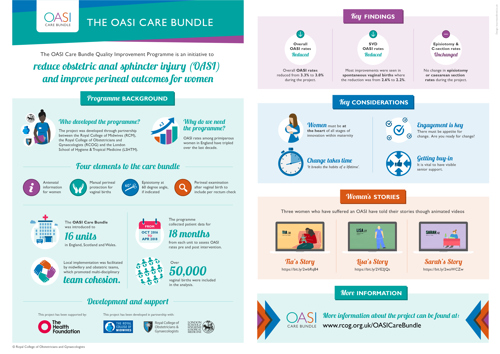Methods
The project team recruited 16 maternity units in England, Scotland and Wales to the study, with both a midwifery and an obstetric champion volunteering to lead the programme from within each hospital. Support from local clinical champions, opinion leaders and professional organisations, as well as patient and public involvement and continuous monitoring and feedback, helped ensure that the interventions were acceptable to women and health care professionals.
The programme ran for 2.5 years. The evaluation of the programme included an analysis of the impact of the OASI Care Bundle on clinical practice and outcomes, and the acceptability of the care bundle to women and clinicians. The results were published in 2020 and are available to download below.
Results
The project team analysed 55,060 births across the 16 participating maternity units during the study, and found that use of the care bundle led to an overall decrease in OASI rates from 3.3% to 3.0%. When adjusting for women’s characteristics and time factors, this amounted to a 20% reduction in a woman’s risk of sustaining an OASI if the care bundle was applied in her maternity unit.
Furthermore, the evaluation showed that use of the care bundle had no effect on episiotomy and caesarean section rates.

You can read the full results of the project evaluation by downloading the open-access papers below:
- Gurol-Urganci et al. Impact of a quality improvement project to reduce the rate of obstetric anal sphincter injury: a multicentre study with a stepped-wedge design (2020)
- Bidwell et al. Exploring clinicians’ perspectives on the ‘Obstetric Anal Sphincter Injury Care Bundle’ national quality improvement programme: a qualitative study (2020)
- Bidwell et al. Women’s experiences of the OASI Care Bundle; a package of care to reduce severe perineal trauma (2021)
- Jurczuk et al. The OASI Care Bundle quality improvement project: lessons learned and future direction (2021)
